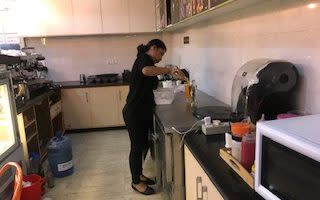The Nepali cafe serving up a new life to victims of traffickers

Tucked away in the chaotic Nepali capital of Kathmandu a serene café is transforming lives of the country’s human trafficking survivors.
The Maiti Café – run by NGO Maiti Nepal – currently employs nine female members of staff that it either rescued from human slavery in India or identified as being at risk to traffickers in Nepal. It plans to employ more women later this year as well as open more cafes across Kathmandu.
Women are paid $120 (£98) a month – a wage more than adequate in a country where one in five still lives on less than $1.25 (£1) a day.
“These are not trafficking victims anymore, these are social entrepreneurs and our goal is to make them businesswomen in the future,” said Bishwo Khadka, the chairman of Maiti Nepal.
The NGO estimates that around 30,000 women and young girls are smuggled to India from Nepal every year, with victims as young as eight.

“Gender discrimination, illiteracy and no job opportunities are the push factors for Nepali girls being trafficked to India,” explains Mr Khadka.
These risks were exacerbated by the earthquake which devastated the country in 2015 and left 3.5 million Nepalis homeless. Increasingly, young women were sent by families across the border to India and in their desperation were willing to trust traffickers who promised employment.
While Nepali women also work in the Middle East, India is often a preferred destination due to the shared cultural and linguistic links between the countries. There is currently an estimated 1.5 million Nepalis in India.

However, traffickers operate with relative ease as Nepalis can live and work in India without needing a visa so it is difficult to monitor women that migrate. On arrival in India many thousands of women discover they will receive little or no pay and will be subject to physical and sexual abuse.
Many are forced to work in the red light districts in large cities like Delhi and Mumbai to pay back debts to travellers. Another NGO, Kat-Katha, estimates one in six sex workers in Delhi's notorious red light district of GB Road are Nepali.
Few have the means to return to Nepal and those that do are typically shunned by their families after it emerges they have suffered sexual abuse.
Maiti Nepal therefore realised it needed to create ways returning victims could live independently. It provides sheltered housing, careers consultation, skills training such as tailoring and legal assistance so women can pursue their traffickers in court.

It also employs former victims at 14 transit points at the India-Nepal border to identify possible victims en route to India. The café is its latest venture with former victims working as cashiers, baristas, chefs and waitresses serving a variety of dishes including Nepali noodle soups and steamed buns.
Its manager Utkarsh Shrestha says they also plan to hire a further six women as it expands. “I’m elated to have an opportunity to nurture our staff members and I hope I can help them become more confident in society,’ he said.
While the women and Maiti are both fearful of disclosing their experiences, it is clear the cafe has changed their lives.
"I have learnt the values of self respect, financial independence and now gained a positive attitude to life," said one victim turned barista.

Protect yourself and your family by learning more about Global Health Security

 Yahoo News
Yahoo News 
